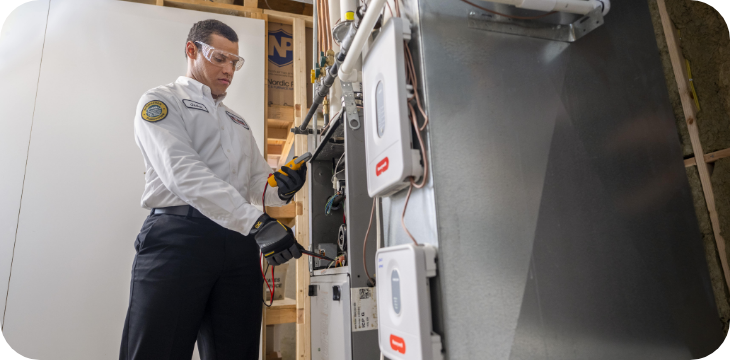High-Quality Repairs for All Systems Provided by DMAKS HVAC.
High-Quality Repairs for All Systems Provided by DMAKS HVAC.
Blog Article
Energy-Efficient HVAC Systems to Minimize Energy Costs
As power expenses proceed to increase, the significance of energy-efficient Heating and cooling systems becomes significantly apparent. These systems not only promise significant cost savings on energy expenses yet likewise contribute to a much more lasting future by lessening energy usage.
Benefits of Energy-Efficient HVAC Solutions
Energy-efficient cooling and heating systems supply countless advantages that prolong beyond mere expense financial savings. One considerable advantage is the minimized environmental influence. By consuming less power, these systems contribute to decrease greenhouse gas emissions, assisting to battle climate change and advertise sustainability. This aligns with enhancing social needs for environment-friendly techniques in domestic and business setups.
In addition, energy-efficient heating and cooling systems often give enhanced comfort levels. A lot of these systems include innovative innovation that permits far better temperature level control and boosted air top quality (DMAKS HVAC). This causes a much healthier indoor atmosphere, which is particularly vital for individuals with allergic reactions or respiratory system problems
In addition, purchasing energy-efficient HVAC systems can enhance residential property value. As more consumers focus on power effectiveness, homes and buildings equipped with these systems may bring in greater quotes in the realty market.
Kinds of Energy-Efficient Cooling And Heating Options
Just how can house owners and services choose the most suitable energy-efficient cooling and heating alternatives for their requirements? The market uses a range of energy-efficient a/c systems, each developed to improve convenience while reducing energy intake.
One choice is the variable cooling agent flow (VRF) system, which effectively controls the temperature level in multiple zones within a building. This system adjusts its refrigerant circulation to match the preferred temperature level, bring about considerable power cost savings.
Another preferred choice is geothermal heatpump, which use the planet's steady temperature level to heat and amazing spaces. By transferring warmth to and from the ground, these systems demonstrate impressive effectiveness, especially in modest climates.
Furthermore, ductless mini-split systems offer an energy-efficient choice for homes lacking ductwork. These systems permit zone-specific heating & cooling, lowering energy waste in vacant locations.
Lastly, high-efficiency heaters and a/c unit, with advanced SEER and AFUE ratings, use dependable environment control while consuming less power than traditional models. By assessing these alternatives, house owners and companies can select a heating and cooling system customized to their details requirements and power effectiveness objectives.
Trick Features to Think About

Next, investigate the kind of compressor utilized in the system. DMAKS HVAC. Variable-speed compressors can adjust their outcome to match the home heating or cooling need, resulting in improved convenience and power cost savings compared to single-speed versions. In addition, look for systems equipped with clever thermostats that use programmable settings and remote access, enabling better control over energy consumption
One more critical function is the system's air filtration capability. High-efficiency filters can improve indoor her response air quality and decrease power consumption by making sure the system operates effectively. Moreover, take into consideration the sort of refrigerant used; modern systems often employ environment-friendly cooling agents that have a reduced environmental impact.
Finally, ensure that the system is suitable with zoning modern technology, which permits personalized temperature control in different locations of your home, enhancing comfort while minimizing power usage.
Tips for Choosing the Right System


Next, take into consideration power efficiency ratings, specifically the Seasonal Power Effectiveness Ratio (SEER) for cooling down systems and the Annual Gas Application Effectiveness (AFUE) for heating unit. Greater scores show better effectiveness, which can lead to substantial cost savings on best site utility expenses in time.
Additionally, examine the sort of HVAC system that best suits your way of living and spending plan. Alternatives include air conditioning, ductless mini-splits, and heatpump, each with its very own collection of advantages and drawbacks.
Do not forget the importance of proper installation and sizing; an inaccurately sized system can result in ineffectiveness and raised wear. Consult with an expert Cooling and heating contractor to get skilled recommendations tailored to your home's one-of-a-kind requirements. This thorough technique will guarantee that you pick an energy-efficient HVAC system that satisfies your demands and budget efficiently.
Upkeep for Optimum Efficiency
When the ideal cooling and heating system is in area, ongoing upkeep ends up being crucial to guaranteeing ideal performance and long life. A well-kept system runs more properly, causing lower energy usage and decreased energy costs. Regular evaluations and tune-ups should be scheduled at the very least two times a year-- when before the air conditioning period and as soon as before the heating period.

House owners ought to additionally be alert about monitoring their cooling and heating system's efficiency. Unusual sounds, varying temperature levels, or increased power bills can show underlying issues that need prompt attention. By attending to these issues without delay, homeowners can avoid pricey repair work and expand the life-span of their systems.
Purchasing an upkeep plan with a qualified service technician not only enhances effectiveness yet also offers assurance, understanding that the system is running at its best. DMAKS HVAC. Regular maintenance is as a result necessary for sustaining energy effectiveness and minimizing total functional prices
Verdict
To conclude, energy-efficient heating and cooling systems provide a sensible remedy for reducing energy costs while enhancing comfort and air quality. By incorporating advanced innovations and alternatives such as geothermal heatpump and ductless mini-splits, residential property proprietors can accomplish considerable energy cost savings and contribute to environmental sustainability. Mindful consideration of system functions and ongoing maintenance further ensures optimal efficiency, making energy-efficient systems a sensible financial investment for both economic and eco-friendly advantages.
Report this page